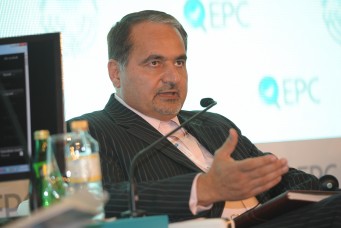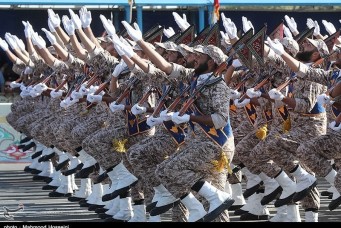Avoiding an Ominous Arms Race
Begin by holding negotiations for a WMD-free zone to which Israel, Iran, and all Arab states are party
In 2020, there will be two anniversaries which relate to the Treaty on the Non-Proliferation of Nuclear Weapons (NPT), which remains the cornerstone of multilateral nuclear non-proliferation efforts. The first is the fiftieth anniversary since the opening of the treaty for signature in 1970. The second is the twenty-fifth anniversary of the treaty’s indefinite extension in 1995, which relates more directly to the Middle East.
The indefinite extension of the NPT in 1995 came about on the basis of three critical decisions: reaffirming the principles and objectives of the treaty toward nuclear disarmament; calling for a strengthened review process to provide for more substantive forward-looking discussions on the status of the treaty; and highlighting the importance of extending the treaty to all states in the Middle East and making a concrete contribution to a Weapons of Mass Destruction Free Zone (WMDFZ) by taking practical measures toward this objective.
An honest assessment of these commitments, especially those on the Middle East, since then shows that no substantive progress was achieved toward a WMDFZ in the region. Even arranging for a forum where states in the Middle East could discuss the establishment of the zone proved elusive. The 2010 process under the sponsorship of three depository states—Russia, the United Kingdom, and the United States—failed to materialize into a regional conference that could launch a process toward creating the zone.
And, while the United Nations will attempt to convene in November 2019 a conference on the establishment of a Weapons of Mass Destruction-Free Zone in the Middle East, Israel and the United States have both already said they would not be attending.
Unfortunately, Israel remains a stranger to all international treaties on the issue of arms control. Several knowledgeable sources also testify to its acquisition of nuclear weapon capabilities. This has made Israel the primary element of dissonance in the region with respect to nuclear weapons proliferation, and the main obstacle to achieving the universality of the NPT, and the establishment of a WMD-free zone in the Middle East.
In more recent years, Iran’s nuclear program has also become an issue of contention. True, it has ratified the NPT, but Iran’s program remains one of concern because of past practice as well as its aggressive regional policies.
Over the past several decades Arab states, and not just Egypt, have embraced the essential principle and internationally accepted fundamental position that peace and security for all cannot be achieved except through a balance of power and commitments in the national security of regional players. This involves not only military capacity, but also legally binding political commitments in arms control—be they bilateral, regional, or international.
The United States, USSR (then later Russia), UK, France, China, India, and Pakistan have pursued these policies in going nuclear, and many others have done the same with respect to smart and conventional weapons. Achieving such a balance in the region without an arms race would either require that countries in the Middle East ratify the NPT as non-nuclear weapon states, or that they establish a WMDFZ in the region. Concluding both of these international and regional measures would be the optimum solution.
It is best to deal with the spread of WMDs in the Middle East by building on what was internationally posited while considering—with special attention— Israeli and Iranian nuclear capabilities because they are the most problematic. Needless to say, the particular and complicated politics of the region would have to be taken into account.
Given that all Arab states have joined the NPT as non-nuclear weapon states, to meet requisite commitments of the treaty, regional measures should complement, rather than serve as an alternative, to international obligations.
In this regard, I suggest: firstly, to hold negotiations under the auspices of the five permanent members of the United Nations Security Council to rid the Middle East of all mass-destruction weapons: nuclear, chemical, and biological. The participating states should be Israel, Iran, and the Arab World. The objective of the negotiations would be to set up regional arrangements to create a Middle East zone free of all WMDs.
Secondly, these negotiations should also establish a transparent and concrete timeline for all regional states to join the NPT, the Chemical Weapons Convention (CWC), the Biological Weapons Convention (BWC), as well as the Comprehensive Test Ban Treaty (CTBT).
Thirdly, any regional agreement decided upon must include verification mechanisms to guarantee states’ commitment to their pledges. These procedures should be under the purview of relevant international organizations specialized in verifying states’ compliance to agreements relevant to such weapons, but could include inspectors from states in the region. Fourthly, the concluded regional agreements should have specific annexes to regulate and limit means of delivery of these weapons.
Many may argue that these are farfetched objectives. Ambitious and complicated, yes, but any simple reflection on history will lead us to conclude that the alternative is to witness a nuclear arms race in the region with ominous consequences and risks. The rational choice is obvious.
Nabil Fahmy is a former foreign minister of Egypt. He is also Dean Emeritus and Founding Dean of the School of Global Affairs and Public Policy at the American University in Cairo. He served as Egypt’s ambassador to the United States from 1999 to 2008, and as envoy to Japan between 1997 and 1999. On Twitter: @DeanNabilFahmy.
Read MoreSubscribe to Our Newsletter





